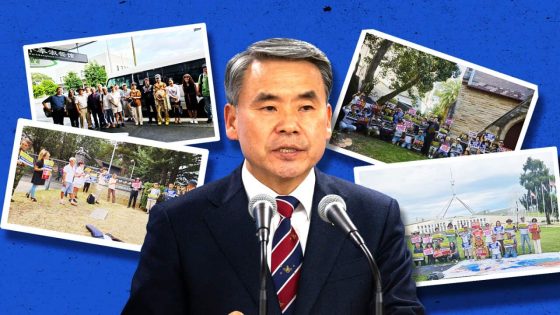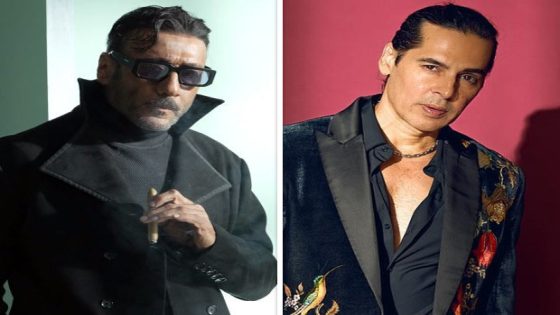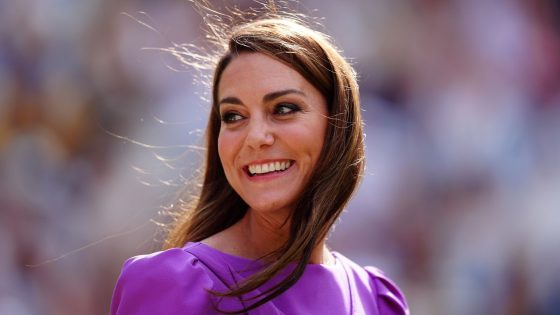Key Points
- Former South Korean defence minister Lee Jong-sup has taken up his post as ambassador to Australia despite facing a corruption investigation in his homeland.
- He faces allegations that he tampered with a South Korean Marine Corps inquiry into the death of Lance Corporal Chae Su-geun.
- Some in the Korean Australian community fear the appointment could be a ‘diplomatic burden’.
On Wednesday, around 20 Korean community members gathered in front of the Republic of Korea’s embassy in Canberra to protest the appointment of Lee Jong-sup as the new Korean ambassador to Australia.
Among them was Hwang Sung-joon, a former Korean marine sergeant who lives in Sydney.
Hwang said he had never joined a protest before, but felt compelled this time.
“I would like to ask if it is in common sense and justice (for Lee) to be appointed to Canberra?” he told SBS Korean.
Former South Korean defence minister Lee arrived in Australia last week to take up his role as the country’s top envoy to Canberra despite facing a corruption investigation in his homeland.
Why is Lee Jong-sup under investigation?
South Korea’s Corruption Investigation Office (CIO) is continuing to examine allegations Lee tampered with a Marine Corps inquiry into the death of Lance Corporal Chae Su-geun.
Twenty-year-old Chae died during a deployment in July last year after being swept away by a torrent at a stream in Yecheon, 161 kilometres southeast of Seoul.
The military faced accusations that proper safety measures had not been taken, and the Korean government promised to thoroughly investigate the cause of the accident.
The marine investigation unit, which Colonel Park Jung-hun of the Marine Corps oversaw, reportedly listed eight officials under suspicion of negligent homicide and other charges.
Last July, then defence minister Lee initially approved the findings, but later issued an order to put off the transfer of the case to the police, a move heavily criticised by the opposition Liberal Democratic Party.
In January, the CIO banned Lee from leaving the country over the allegations, but on 4 March he was appointed as the new ambassador to Australia.
Australia’s Deputy Prime Minister Richard Marles meets with Republic of Korea’s Minister of National Defense Lee Jong-sup at Parliament House in Canberra, Thursday, August 4, 2022. Source: AAP / MICK TSIKAS/AAPIMAGE
On 8 March, South Korea’s Justice Ministry lifted the travel ban on Lee.
South Korean Prime Minister Han Duck-soo said Lee’s appointment and departure wouldn’t cause any disruptions to CIO’s judicial proceedings.
“If the anti-corruption body says it needs to question him further, Lee will come back and face questioning at any time,” The Korea Times reported the prime minister as saying.
The CIO also announced that they would recall Lee for investigations.
Defence cooperation or ‘diplomatic burden’?
Kim Sung-young, an associate professor at the Macquarie School of Social Science, said the appointment of a former defence minister as the new ambassador to Australia was “symbolic”.
“It just shows how seriously the South Korean government is taking the Korean-Australian relationship,” Kim said.
“I think it’s pretty significant in terms of just how seriously Seoul is considering Australia and I think policymakers in Canberra would be very welcoming of his presence.”
But Jeffrey Robertson, an associate professor of diplomatic studies at Yonsei University in Seoul who has worked for the Australian government in diplomacy and foreign policy, argued the appointment must be understood in the context of the wider Australia-Korea relationship.
“Both Australia and Korea pay scant attention to the relationship, and despite eager claims to the contrary, put very little effort into the relationship,” Robertson said.
“For South Korea’s diplomats, Australia is not a career-enhancing post. It’s popular for those with young families and it’s a sop for those near retirement. Reflecting this, if Lee Jong-sup were being appointed because of his diplomatic skills, it would more than likely be somewhere else.”
Korean community members gathered in Sydney to protest the appointment of Lee Jong-sup as the new Korean ambassador to Australia. Credit: Jeremy Kim
Views from the Korean Australian community
Some Korean Australians have voiced their concern over Lee’s appointment.
“We feel angry that they lifted a travel ban on Lee and made him leave the country as an ambassador, a very important representative of Korea,” Pastor Hahn Moses Joonhee, who attended a rally in Canberra, said.
“As a Korean living in Australia, I feel terrible. This could be a diplomatic burden between Korea and Australia,” he added.
Lee Anna* (pseudonym), who lives in Melbourne, said, “It is against diplomatic practice and common sense that a former defence minister implicated in a corruption investigation was appointed as an ambassador even before the domestic problem was resolved.”
Further protests are expected in Sydney, Melbourne and Brisbane.
According to the Korea Times, South Korea’s presidential office has rejected allegations it unfairly interfered with the military investigation.
A spokesperson for the Embassy of the Republic of Korea in Australia told SBS Korean in a statement, “Australia is our comprehensive strategic partner and a very important partner for the implementation of Indo-Pacific Strategy.”
“Our embassy will do our best to continue to develop friendly and cooperative relations between the two countries.”
These sentiments were shared by Australia’s Department of Foreign Affairs and Trade.
When asked for comment about the protests against the new ambassador’s appointment, a DFAT spokesperson said, “Australia values its important relationship with the Republic of Korea and looks forward to working with Ambassador designate Lee in his new role.”





